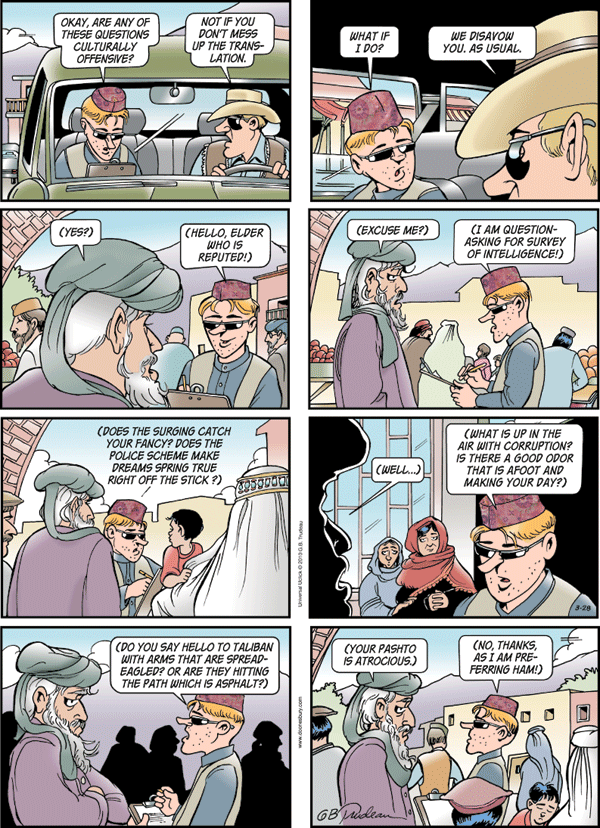My hovercraft is full of ham
« previous post | next post »
Today's Doonesbury explores the problem of over-ambitious translation:
This is more realistic, but less funny, than the classic Monty Python Dirty Hungarian Phrasebook sketch:
(And then there's Sir Richard Burton's English/Harari Phrasebook, from the appendix to First Footsteps in East Africa…)

tudza said,
March 29, 2010 @ 8:02 am
I was about to object that the hovercraft is filled with eels, but I think I take your meaning.
Ben said,
March 29, 2010 @ 9:55 am
I would like to feed your fingertips to the wolverines.
mark said,
March 29, 2010 @ 2:59 pm
hmm…when click on the cartoon, it is not embiggened; elsewise actually
[(myl) You need to get a bigger screen. On your small one, if you execute right-click >> Open link in new window (or the equivalent) you should get an image in which you can scroll to see the whole.]
Peter Harvey, linguist said,
March 29, 2010 @ 3:02 pm
Of phrasebooks, battleship lieutenants and lightning-struck postillions…
On the Language Log Mark Liberman reminds us, via Doonesbury and Monty Python, that translation is not without its pitfalls. The Hungarian phrase book sketch led me to take down from my bookshelf a real phrase book that contains such gems as ‘Were yo…
K. said,
March 29, 2010 @ 5:07 pm
Both the cartoon and video clip seem to ring a bit false based on both anecdotal and empirical evidence of second language acquisition.
On the first count: Would any speaker with such a tenuous grasp on the language really have the confidence to barrel through such a huge spiel uninterrupted without any indication of positive reception from his interlocutor? And would any native speaker willing to endure such an onslaught really be so overtly callous in their assessment of their interlocutor's language abilities?
On the second account: Rarely, if ever, have I seen a language barrier interfere but momentarily with a commercial exchange. Fools always find a way to part with their money, and vendors always find a way to ease the transition.
I don't mean to be a spoilsport, but comedians are generally so much on the mark that I tend to hold them to a bit of a higher standard of insight than, say, the news media.
Joe Fineman said,
March 29, 2010 @ 8:43 pm
W. H. Auden cites a phrasebook in which "Posso presentare il conte" was translated "Meet the cunt".
Juliette said,
March 29, 2010 @ 10:04 pm
I have recently begun translating poetry and studying theory of translation. I would like to first point out the difficulties of translation as a translator relies on dictionaries and native speakers which already is a form of translation that can be inaccurate. Spanish philosopher Jose Ortega wrote, "The "misery" of translation is its impossibility, because of irreducible differences which are not only linguistic, but cultural incommensurabilities…" I think this is well displayed in the Doonesbury comic and also that the idea of equivalence of words or phrases does not exist.
Ginger Yellow said,
March 30, 2010 @ 5:46 am
Juliette – I assume you've read Eco's Mouse or Rat? If not, you definitely should.
Graeme said,
March 30, 2010 @ 9:10 am
On the other hand John Cale built a song, Cordoba, out of phrases from an English-Spanish phrasebook
Ray Girvan said,
March 30, 2010 @ 9:19 am
Doug Hofstadter's metaphor in Metamagical Themas – translation as "stepping stones" – is quite nice too. Same idea of the "stones" (words and phrases) being in different places in the concept space, so that a "better" translation might not be one that tries to follow the same path, but one that creates the same shape of path elsewhere in concept space.
An example might be translation of the poetry of Morgenstern, which often depends on German puns that don't work in English. For instance, "Der Purzelbaum" ("The Somersault") explores imagery around the word's literal German meaning of "tumbletree"; this being impossible in English, Alexander Gross's very loose translation instead explores "summer" and "salt" in a similar manner.
Sili said,
March 30, 2010 @ 9:32 am
K.,
This is a satire of the CIA. Secondly the young man in question is utterly incompetent and unaware of it (see Dunning-Kruger).